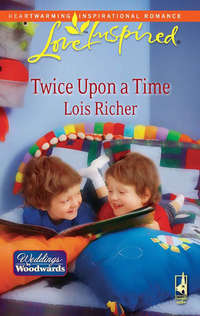
Полная версия
North Country Mom
“Yes.” She looked a bit surprised at his sudden question but didn’t volunteer any more. Instead, she averted her eyes as if hiding something.
“Where do your parents live?” Why did he feel compelled to learn more about her?
“They died when I was thirteen.” Alicia faced him, her eyes darkening to black diamonds. “My dad was a pilot. They were returning from visiting a friend up north when their plane crashed. I was sent to live in Vancouver with a distant relative.” Her gaze challenged him. Any other questions?
“I didn’t mean to pry,” he apologized.
“It’s not a secret. Anyone in Churchill could have told you the same thing,” she said.
But Jack was pretty sure they couldn’t tell him any other details about Alicia Featherstone. According to Laurel, she kept to herself. He guessed most people respected the resolute barriers she wore like shields.
“Can I ask you a question?” Alicia murmured.
“I guess.” He waited warily, hoping she didn’t have the wrong impression. Alicia was very pretty but he wasn’t interested.
Liar.
“What’s with the boots?” Her gaze fell to his feet.
“You don’t like them?” Jack held out one foot, admiring the feel of the supple leather snuggled against his toes without pinching.
“They’re great. Very, uh, pretty.” She wrinkled her nose. “It’s just that you don’t strike me as the pretty type.”
“Thanks.” Jack smothered his chuckle when she dipped her head. “It’s not about fashion. I do—did,” he corrected gloomily, “a lot of work on my feet. I decided early on that I wasn’t going to be a literal flatfoot so I bought good shoes.”
“You do realize they’ll be ruined in Churchill?” she warned. “You must have noticed on previous visits that we only have pavement in some places. Other streets are gravel. The worst roads around town are dirt. If you wear those on the beach, the stones will poke through the soles and you’ll suffer a lot worse than flat feet.” She thrust out her own foot. “Trust me. You will end up in ordinary hiking boots, just like the rest of us.”
“Never.” He liked her dare-you attitude. “Tell me about your store.”
“Tansi?” She frowned, leaned her head to one side. “I told you. I gather First Nations work from all across Canada, some of it very unusual. I try to sell it with bits of history attached, to give tourists perspective on how the piece came to be, what it means to our culture.”
Jack noted how a sparkle lit up her eyes as she spoke. It was clear Alicia loved her work. He paid close attention as she continued.
“There’s a lot of prejudice toward Native Canadians.” Her chin thrust out as if to defend her people. “I’m trying to create a bridge by showing and teaching the values in our culture. I want to help people appreciate the meaning of their purchase.”
“What kinds of things do you sell?” He wanted to keep her talking. She intrigued him. Surprising when nothing had really interested him for ages.
“My stock changes constantly. There are no two things alike. At the moment I have an Inuit carving of a walrus, very tiny but perfectly detailed. A woman makes beaded slippers with real rabbit fur trim for my shop. She lives entirely off the land. This trip I restocked silver and beaded earrings made by a village elder who is wheelchair-bound but the most creative lady you’ll ever meet.” Alicia shrugged. “I also have some paintings of the northern lights, knitting that’s been dyed from local plants, photos of the area. All kinds of things.”
“And I’m sure the polar bears are represented, too,” he teased.
“Of course. Bears are an important part of Cree culture,” she said.
“Do you make any of these crafts?”
“I’m not really talented in that way.” The light in her eyes faded to a dull mud tone. “I never had much time to learn the old ways because I was taken from my community when my parents died.”
“Were you adopted?” he asked, curiosity growing.
“No. I was thirteen. Adoptive parents want babies or very young kids.” She frowned at him. “Why did you ask that?”
“Just wondering.” But Jack knew he couldn’t shut down like that. He’d poked into her life; turnabout was fair play. Besides, he needed help to figure out his next move. “Giselle is adopted. My wife wanted to keep it a secret as long as she could. I didn’t agree but Simone was adamant. Then she died. I thought I’d tell Giselle when she turned sixteen.”
“But she found out first?” Alicia guessed.
“Yes.” His lips tightened into a line. “Two months ago she found her mother’s old diary and figured out we weren’t her birth parents.”
“It happens.” Alicia didn’t say any more but somehow Jack felt her empathy.
“She’s really angry that we didn’t tell her.” He sighed. “That’s natural, I guess. But she keeps demanding more information about her birth family.”
“And you don’t want to tell her?” Disapproval laced her voice.
“I can’t tell her more because I don’t know any more.” Jack’s jaw clenched. Why had he started this?
Alicia leaned against the window of the train, her gaze on him.
“I have so little information.” He raked a hand through his hair as helplessness gripped him. “There’s nothing to go on. Simone insisted on a closed adoption. That means that Giselle can’t find out anything more than what we already know until she’s eighteen. Then she can request the adoption agency in British Columbia to open her file.”
“Normal procedure.”
Jack nodded. Did Alicia know about adoptions? If she did, maybe she could talk to Giselle, help her understand it wasn’t his fault he couldn’t get the answers she wanted.
“I’m assuming her birth father’s name wasn’t listed or is a dead end?” Alicia asked.
He nodded. “Dead end.”
“But surely you have the name of the biological mother on Giselle’s birth certificate?” Her head tilted to one side as she studied him. “You were a police officer. You must have a lot of contacts. Couldn’t someone track the name?”
He didn’t want to answer but Alicia kept waiting.
“I did track her.” Jack sighed. “Two years after the adoption, Giselle’s birth mother disappeared. There’s no trace of her.” Oddly, it felt good to discuss this with her.
“What about Laurel? Surely as a former social worker, your sister could—”
“Social workers are provincial employees,” he explained. “Laurel never worked in that province.”
“I see.” Alicia fell silent, apparently lost in thought.
“Can I ask you something?” Jack waited until she nodded. “How do you know about adoptions? You said you were never adopted so—” He let it hang, his curiosity about her growing.
“I wasn’t.” Her gaze moved to one side, avoiding his. “I, um, for a long time I’ve been looking for someone who was adopted. But the clues I had led to dead ends. I don’t have connections like you do so I don’t know where to look next.”
“My connections weren’t much help,” Jack told her. He dug in his pocket and pulled out the slip of paper he’d been carrying around since his last day of work. “But this might be. Someone gave me this website address. They said it’s been helpful to others. It wasn’t for me, but you’re welcome to copy the address and check it out.”
“I, um, don’t have a pen or paper,” she said after a moment’s hesitation.
“I do.” Jack pulled out the small pad and pen he always kept in his breast pocket and held them out. “Old habit from my detective days.” Surprisingly she didn’t take, either. “You already know about this site?”
“No.” Her cheeks darkened. “This is embarrassing. You see, I have really bad eyesight and my glasses are in the bag you put up top. Would you mind copying it out for me?”
“I can get the bag,” he offered, shifting to rise.
“No, no. Don’t stir yourself.” She laid her hand on his arm. “You’ll wake up someone.” She jerked her hand away. “If you could write it down for me, I’d be grateful.”
“Sure. Okay.” He scribbled down the web address, tore out the sheet and handed it to her.
“Thank you.” Alicia studied it for a moment then folded it and tucked it into her jeans pocket. “I’ll take a look when I get home.”
“I hope it helps.”
When Alicia merely smiled at him before turning her face to the window, Jack understood that was all the conversation she wanted for now. Suited him. He didn’t want her to think he was trying to get too friendly. He checked on Giselle then pulled his e-reader from the seat pocket in front and flicked it on.
But the novel couldn’t hold Jack’s interest. Instead he got hung up thinking about the woman next to him. There was something about Alicia Featherstone that intrigued him and it wasn’t only her quick rush to defend God.
Though she’d been friendly enough, she had a quality about her that said no trespassing. She seemed to not need anyone else. Self-contained, that was it.
Jack couldn’t help wondering why. Alicia was lovely to look at, had a nice figure and ran her own independent business. She appeared to have her life together. And yet when she’d crashed into him earlier, she’d jerked back, ready to protect herself. He remembered how she’d ordered him to let go of her arm. She’d tensed—an automatic response to a perceived threat.
Because she’d had to defend herself before?
As he’d told Laurel, Jack wasn’t interested in a romantic relationship with anyone. But his detective background made Alicia’s almost bristling reaction interesting, as had her response when he’d asked if she had kids. Suddenly Jack could think of a hundred questions to ask the lovely Indian woman.
She’s nothing to do with you. You and Giselle are on your own. Even if you could forget what you and Simone shared, are you really willing to risk loving again and losing again?
No.
In a rush, the lost, empty feeling he’d battled for two long years returned. He’d barely survived the pain of Simone’s death and that was only because of Giselle, because he was determined not to lose her, too.
Alicia Featherstone might become his coworker on the kids’ project, but that’s all she could ever be. He would not contemplate loving and losing again.
Jack twisted in his seat so his back was to Alicia. He forced himself to read the words on his screen. But despite his best intentions, every so often his glance slipped to the silent woman in the seat next to his.
Though he was tired, sleep evaded him.
Given his curiosity about Alicia Featherstone, he should probably refuse to work with her. But he wasn’t going to. He had too many questions that demanded answers.
Chapter Three
Alicia awoke feeling watched.
Sure enough, when she peeked through her lashes she found a dark brown gaze fixed on her. Self-conscious and disheveled, she swallowed and tried to think of what to say to Jack’s daughter.
“You snore.” Giselle flopped into the seat her father had obviously vacated while Alicia was asleep. “Delicately, but still. It’s snoring.”
“Good morning.” Alicia gave her a pointed look. “My name is Alicia Featherstone. And you’re Giselle, I understand. It’s nice to meet you.”
“Yeah.” The girl flicked her long hair over one shoulder. “I guess that was rude.”
Ignoring her unrepentant stare, Alicia said nothing. She pulled a brush from her purse, undid her braids and combed out her hair before swirling it into a topknot on her head.
“Sorry.” Giselle didn’t sound the least bit sorry.
“I hear you’re moving to Churchill,” Alicia said, cutting her some slack.
“So Jack says.” The chip on Giselle’s shoulder was huge.
“Jack?” Alicia tamped down her irritation at this cheeky child.
“Well, I can’t really call him Dad, now can I?” Giselle snapped in a sour tone.
“Why not?” Spoiled, Alicia thought to herself.
Yet her heart ached for the confused girl. Giselle’s world had been rocked, first by her mom’s death and then by learning nothing she’d believed about her family was true. Moving away from all that was familiar couldn’t be easy, either.
“Jack hasn’t been your dad for all these years?” she asked gently.
“Yes.” Giselle whooshed out a breath that blew her bangs all over. “He has. He’s been a really good father and I love him a lot. That’s why this is so hard. He lied to me.”
“I didn’t lie, Giselle.” Jack stood in the aisle. His face conveyed his hurt.
“Lied by omission then.” She jumped up and held out a hand. “Can I have some money to buy breakfast?”
“I guess I’m your father enough for that, huh?” Jack muttered with a sideways glance at his daughter. She simply shrugged. He transferred the two cups he carried into one hand then fished several bills out of his shirt pocket and handed them over. Giselle flounced away. “Nothing for me, thanks,” he muttered, staring longingly at her departing figure.
“Preteen. It’s a horrible age,” Alicia consoled. “She’ll get over it.”
“Soon, I hope.” He held out a lidded cup. “Coffee. I figured you could use some. You look great, but it wasn’t the most restful night I’ve ever had.”
“Thank you.” She accepted the cup, freezing for a moment when his warm fingers brushed hers. “Maybe I’m used to these chairs because I’ve ridden the train so often.”
“To get your store stock?”
“Uh-huh. The sleeper cars are always booked far in advance. Since I’m never sure when I’ll be on the train, I always sleep in the chairs,” she explained. “I don’t mind traveling at this time of year. The landscape is amazing. Seeing spring arrive from the train is far more interesting than watching snow drift in winter.” She sipped her coffee, enjoying the rich dark flavor. “Thank you for this.”
“Sure. My sister told me about a project you’re planning for her Lives boys. That’s what locals call her rehabilitation center, right?”
“Yes.” Alicia nodded. “It’s a shortened version of Lives Under Construction, which we use to refer to the army barracks she’s renovated, the outbuildings and all the land around.”
“I thought so.” Jack sat down, stretching his legs in front. “So—a sod house, right? Laurel asked me to help.”
“She did?” Alicia stared at him. “I didn’t know that.” She shook her head, uneasy at the prospect of having Jack nearby, watching her. “You don’t have to bother. We’ll manage. The boys are very responsible.”
“I’m sure they are. But I promised and I don’t break my promises to Laurel, ever. She’s the older sister and she makes me pay,” he teased. Then a frown flickered across his face. “It sounds like you don’t want my help.”
“It’s not that.” She bit her bottom lip, struggling to rephrase the truth.
“Don’t worry, Alicia. I know how to take directions.” He chuckled when she couldn’t mask her dubious expression. “I’ll help, but the hotel will have to come first.” He tipped his head to one side, studying her. “How did you come up with the sod house idea anyway?”
“From a display I saw.” She leaned her back against the window to put as much distance between them as possible. She would have moved across the aisle if Giselle hadn’t left her things scattered over both seats.
Oddly enough, Jack’s nearness didn’t make Alicia feel unsafe and it wasn’t just that he was a cop and also Laurel’s brother. Jack was still grieving for his wife. She couldn’t imagine he was the type to try to take advantage of her here on a public train. But mostly she wasn’t worried because he’d emphasized that he intended to remain single.
Still, his nearness caused a nervousness deep inside her that Alicia didn’t understand.
“What kind of a display?” Jack asked.
“It was held inside a caribou tent and it was amazing.” She tried to explain but cut it short when his eyes began to glaze. “Anyway, the presenters were descendants of an original settlement family. Their elder told stories about how their ancestors built sod houses to live in. I thought it would be fun to build one as a summer project for the boys. Kyle Loness—he’s the activities director at Lives—and Rick Salinger, our minister, have both promised to help.”
“Sounds interesting. Do you have a book about it, or plans?” Jack asked.
“No,” Alicia answered, slewing her eyes to the window, though there was nothing unusual in the muskeg pushing up to reveal the permafrost beneath. “All I have is a rough sketch an elder drew for me.”
“Well, I guess you could get the library to order some books.” Jack savored his coffee, his face thoughtful. “You can’t just go out and start digging. You’ll need some kind of plan.”
Alicia gulped, because that was exactly what she’d intended to do—start digging as soon as the town allocated the land. Now she realized how silly that was. Of course they would need a plan. Houses were built in stages.
Rattled by the thought of being asked to consult a book, she knew she’d have to be careful or else Jack and the rest of Churchill would discover she couldn’t read very well. Her mother had tried to teach her when their remote village lost its teacher, but her English hadn’t been great. When she’d been moved to Vancouver, Alicia had struggled and failed to catch up.
“Since you’ll be helping us, perhaps you wouldn’t mind contacting the library,” she said, crossing her fingers that he’d accept.
“I guess I could.” His forehead furrowed, he plied her with questions.
Alicia answered as best she could but his proximity unnerved her. She was grateful when Giselle finally returned.
“I hope you don’t mind if I ask this.” The girl stood in the aisle, leaning against the seat in front. “You’re an Indian, aren’t you?”
Jack choked on his coffee then glared at Giselle, clearly aggravated by her impudence.
“Native Canadian Indian, yes.” Alicia held her gaze as she said the words proudly, refusing to back down. “Why?”
“One of my teachers said you often have names that have special meanings.”
“You’re asking if Alicia is a traditional Native name?” she said.
“Yes, like Piapot.” Giselle frowned. “Do you know what that name means?”
“One who knows the secrets of the Sioux.” She hid her smile as Giselle’s eyes brightened. “I’m sorry to disappoint you. I’m afraid I’m just plain Alicia Featherstone.”
“Well, at least you have Featherstone, though I don’t know what meaning that could have. Feathers and stones are complete opposites,” Giselle complained.
“Sorry.” Alicia hid her smile. “If you’re interested in learning about Chief Piapot, every Thursday night I lead a campfire at Lives. I tell the boys stories of Native history. You’re welcome to join us.”
“Thanks.” Giselle’s smile lit up her face. She returned to her seat across the aisle. Moments later she was busy on her pink cell phone.
“I’m sorry,” Jack apologized. “Sometimes I have no clue what will come out of her mouth. I’m not sure she does, either.”
Alicia burst out laughing. “Forget it. That in-your-face attitude is what makes kids so refreshing.”
“I’ll try to remember that,” he said drily. “Hey, we’re slowing down.”
“Yes. We’ll arrive in Churchill soon.” She smiled. “Did I ever thank you for rescuing my packages?”
“I wouldn’t want Tansi’s stock to go missing.” He studied her for a moment. “I don’t know much about your kind of business, but Laurel says you’re doing very well. Have you ever considered expanding? There’s a much bigger market outside of Churchill that could use some education about your culture.”
Warmth exploded inside her. At last, someone who thought like her. She gazed at Jack with admiration.
“I dream about having a second store, maybe in Winnipeg, but I haven’t worked out how to do it.” Alicia hesitated, realizing she’d just shared her dream with a total stranger, a dream no one else knew about. Why was it so easy to talk to Jack?
Just as quickly her excitement drained away. There was no point in thinking about future expansion with him or anyone else. People like her with no sources of funding didn’t have second or third stores. And now that Mr. Parcet was asking questions about her, it was only a matter of time before he’d show up to get information. He wasn’t going to get it from her, of course, but she had to put her dreams on hold and concentrate on making sure her son was safe before Mr. Parcet found her.
How do I do that, God, when I don’t know where he is?
Alicia stared out the window, lost in ways and means she might employ. The first thing would be to talk to the social worker she’d been assigned when she was fifteen and had given up her son. What was her name? Mrs. End-something. Endecott? Enderby? Endersley, that was it. She silently repeated the name to fix it in her mind.
“I want to talk to Alicia, Dad. Can we change seats for a while?”
Alicia blinked out of her thoughts and found Jack studying her. He raised one eyebrow.
“Do you mind speaking with Giselle?” he said. “It’s okay if you’d rather rest.”
“She’s not old, Dad. She doesn’t have to rest.” Scorn laced Giselle’s shrill tone.
“Actually I’ve been up for about thirty-six hours and I am a bit tired, Jack.” Alicia smiled at him, deliberately cutting Giselle out of the conversation. She felt sorry for the child, but she wanted to make a point to Giselle to curb her attitude.
“I’m sorry.” Giselle was a quick study. She looked remorseful as she shook her head. “You must be exhausted. It’s just that I’m curious about those stories you mentioned. Will you tell me more?”
Wasn’t her life goal to bring awareness and knowledge to the world about her culture? Alicia nodded. “I guess we could talk for a while, if your father is agreeable.”
“As long as you are.” Jack waited for Alicia’s nod. He gave her a quizzical smile before he rose and moved across the aisle.
Giselle sat down in the seat he vacated. She fiddled with her hands for a few moments before she looked at Alicia. “My mother would have been furious if she’d heard me be rude,” she admitted.
“And you want to get back at her for dying, or something?” Alicia frowned.
“No.” Giselle shook her head.
“Your father then?” And here she’d thought preteens would be easy to understand. Alicia took a shot anyway. “You blame your dad.”
“For Mom’s death?” Giselle frowned and shook her head again. “I don’t blame him but—”
“You want him to pay,” Alicia said in sudden understanding.
“I want my life back the way it was,” the girl said fiercely with a sideways glance at her dad, who had his nose buried between two black covers. “I want my mom.”
“I know you do. But that isn’t going to happen, Giselle, and I think you know it.” Alicia kept her tone gentle. “I doubt your dad likes the way things are any better than you, but don’t forget he lost someone, too. I’m sure he’s doing the very best he can.”
“It’s not enough.” Tears filled Giselle’s dark eyes. “Aunt Laurel says I need to talk to God about it, but I’m mad at God, too.” She wrapped her arms around her middle and thrust out her chin. “I feel mad at just about everyone.”
“I understand.” Alicia laid her hand on the girl’s shoulder. “Maybe this won’t help much right now, but things will get better. Eventually. God has wonderful things planned for you.”
“You think?” Giselle stared at her, her big brown eyes begging for confirmation.
“I know. There’s a verse in Psalms that I sometimes repeat to myself. It says, ‘Weeping may endure for the night but joy comes in the morning.’”
“My mom had something like that written in one of her diaries,” Giselle murmured. She was silent for a long time before she brushed away a tear and rose. “I really do want to hear your stories, Alicia, but maybe you and I could talk another time. Excuse me.” Then she scooted across the aisle.
“I don’t know what you said,” Jack said when he eventually returned to the seat beside Alicia. “But thank you. Giselle apologized to me.”
“Don’t thank me. You have a lovely daughter.” Alicia shared a smile with him, but it lasted a second too long and that made her stomach clench. This man had an odd effect on her and she didn’t know why. She ducked away from his gaze. “We’re coming into the station,” she said. “Would you mind giving me my things you put up top? I’ll pull out my sweater and try to stuff the packages into the backpack so you can have your bag back.”








